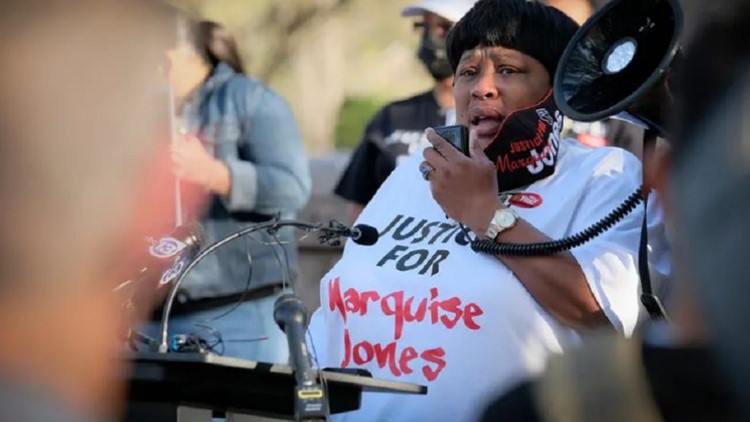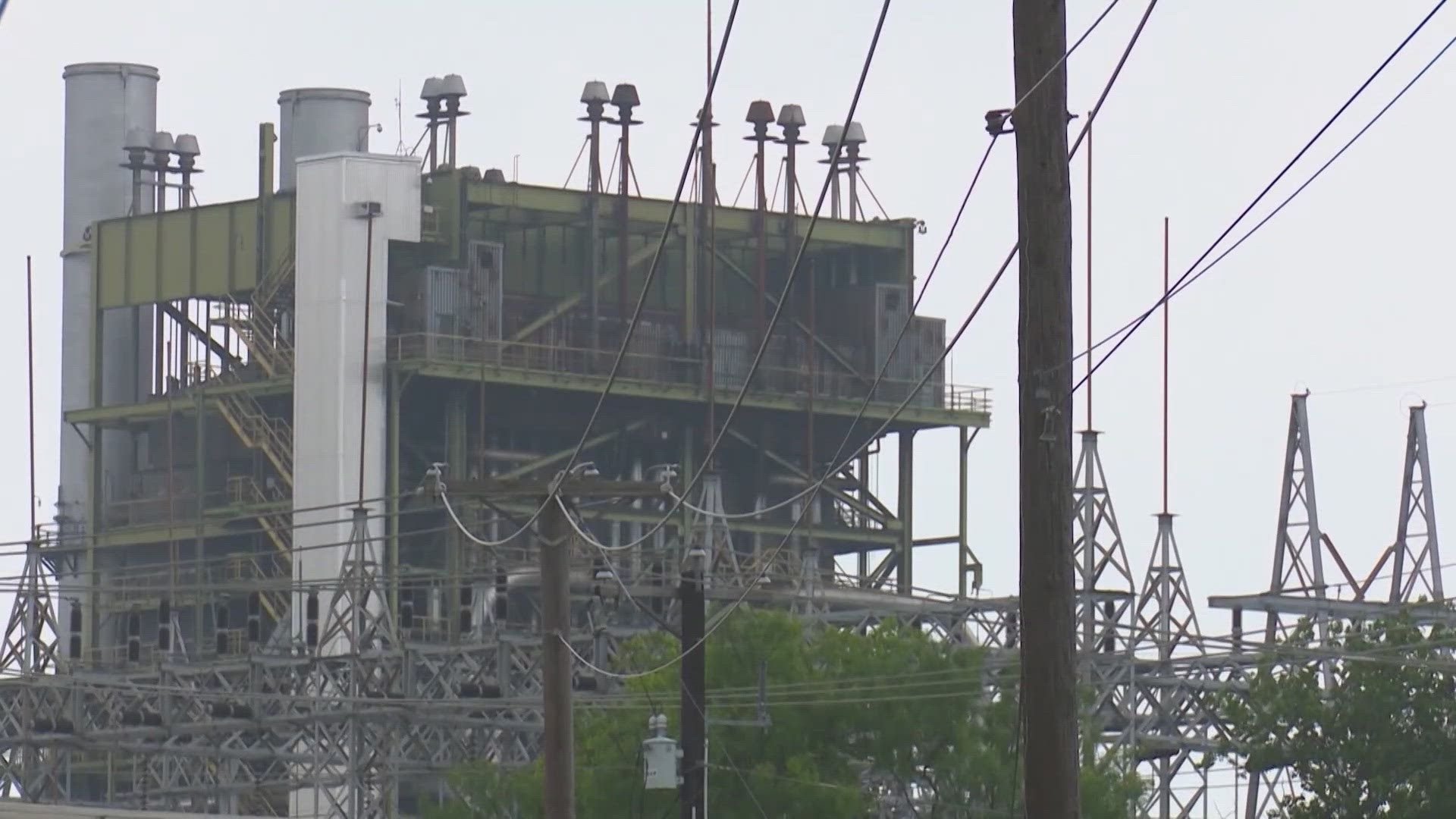SAN ANTONIO — This story was published by the Texas Tribune.
For seven years, Debbie Bush has fought to make those in power see the injustice she sees.
In 2014, her nephew was killed by an off-duty San Antonio police officer at the age of 23. Marquise Jones was shot in the back running from the scene of a fender bender in a restaurant drive-thru lane. The officer said Jones had a gun — other witnesses say he didn't. The officer was cleared of wrongdoing and remains on the force.
Since then, Bush has rallied. She has held up others who suddenly found themselves with similar heartache. And she has pleaded with local and state policymakers to change a system that repeatedly results in police using violence against Black people.
“Every time there’s another killing anywhere across this country, it opens up wounds for all of us,” she said at a small rally at the Texas Capitol in March. “We’re dying every day in these streets from the police, and nothing is being done to the police.
Recently, her resolve was dwindling. After seven years, it still didn’t feel like anyone was listening.
Despite a newly revived national movement against police brutality and racial injustice, she watched as more and more reports of police violence against Black and Hispanic people battered the news cycles. At the same time, Texas’ George Floyd Act, named for the Black man whose in-custody death in Minneapolis sparked the movement last summer, had stalled in the state Legislature.
“It made me want to give up,” she said haltingly Monday, pausing to release quiet sobs.
The next day, the world watched as Derek Chauvin, the officer who killed Floyd, was found guilty of murder. And Bush and other police reform activists felt the ground shift underneath their feet.
“Now that the nation has seen what the nation has seen and the jury has spoken, hopefully that means to the state what it means to the rest of the world,” said Gary Bledsoe, president of the NAACP of Texas.
Bledsoe hopes the historic verdict will propel forward the state’s major reform bill as well as other measures tackling police behavior and accountability in the final weeks of the legislative session. State Rep. Senfronia Thompson, a Houston Democrat who authored the George Floyd Act, said in a statement Tuesday she will continue to fight for House Bill 88.
Watching the judge read out the guilty verdicts Tuesday relit a fire in Bush and others advocating for Texas’ police reform legislation.
“If this doesn’t push it, we don’t know what will,” she said.
he message has gotten through to at least some in the Texas Capitol. State Sen. Royce West, a Dallas Democrat, said he is laser-focused on social justice issues and law enforcement accountability this legislative session.
Since 2016, Texas law enforcement agencies reported more than 900 shootings by police. Of those shot, 28% were Black. During traffic stops that resulted in police use of force last year, 26% of the people were Black. In Texas, 12% of the population is Black.
Recently publicized police violence against Black and Hispanic people has only strengthened the senator’s call.
West condemned the pepper-spraying and force used on Caron Nazario, an Army second lieutenant in Virginia, at a traffic stop. He denounced Daunte Wright’s killing in Minnesota when a veteran officer said she mistook her Taser for a gun. This month, video was also released of Chicago police shooting and killing 13-year-old Adam Toledo and officers fatally shooting 16-year-old Ma’Khia Bryant in Columbus, Ohio.
Wright, Toledo and Bryant were all killed as Chauvin stood trial for Floyd’s death.
“That’s happening in 2021,” West said last week. “Things are getting better? No, things are getting worse.”
Moving parts
Texas’ George Floyd Act, like reform legislation filed in many other states and at the national level, includes measures requiring officers to intervene if another is using excessive force, banning chokeholds and implementing more disciplinary practices for officer misconduct.
Last month, a House committee heard hours of testimony on HB 88 — largely from supporters. But police union officials pushed back on many provisions, especially one that would remove police officers' shield against lawsuits when they’re accused of violating someone’s state constitutional rights. Called qualified immunity, this legal shield has also been a sticking point in other states’ legislatures.
Since then, the bill has stagnated, idling in the House Homeland Security and Public Safety Committee.
State Rep. James White, the only Republican in the Texas Legislative Black Caucus and chair of the committee, said Monday that lawmakers are still working behind the scenes, but he acknowledged HB 88 might not pass. Instead, lawmakers are focusing on some of the numerous standalone bills Thompson also filed to address specific reforms, he said.
For example, his committee approved Thompson’s House Bill 830 last week, a bill that targets one provision of the George Floyd Act that has been pushed for years — limiting officers’ ability to arrest people for traffic offenses that at most would result in a fine. Other pieces of the omnibus bill — requiring officer disciplinary guidelines and corroboration of undercover police testimony — have been approved piecemeal by House committees led by Democrats.
The full chamber has also passed a bill to bar reality television crews from pairing with law enforcement patrols, White noted. The bill honors Javier Ambler, a Black man who died after Williamson County sheriff deputies — with video crews from a reality TV show riding along — chased him because they said Ambler didn’t properly dim his headlights, and then repeatedly tased him.
“They’ve lost people on the front lines of this issue, and we’re going to continue to chip away,” White said, referring to Bush and other family members. “You also have to think about the front line law enforcement, the peace officers.”
Police union officials opposed to proposed changes to police tactics and accountability argue that Chauvin’s verdict is proof that accountability already exists. On Wednesday, Chris Jones with the Combined Law Enforcement Associations of Texas said at a legislative hearing that some reform efforts would erode due process.
“You all have a choice on two directions to go: to enact measures that are punitive to officers who are doing the job that will encourage them to leave and do something else, such as taking away qualified immunity,” he said. “The other option is: Do we pass legislation that bolsters the training and the hiring qualifications so we have the best people doing this job?”
The Senate has begun to move targeted reform bills that are supported by police unions. The bills, approved by a committee last week, would restrict police chokeholds, require officers to intervene if another is using illegal and unreasonable force, and instruct officers to provide first aid and call ambulances for injured people. The full chamber unanimously approved the latter two Thursday, sending them to the House.
Though narrow in focus, Bledsoe with the NAACP still deems these bills essential and potentially life-saving. In the Rio Grande Valley last year, Jorge Gonzalez Zuniga died months after sheriff deputies beat him, tased him, and knelt on his neck.
“One thing you learn about a legislative process, especially when you represent people who are in need, you have to take what you get,” Bledsoe said.
"It has to stop"
For grieving families, it’s still not enough.
Brenda Ramos found herself unwillingly fused to Bush’s cause one year ago, when an Austin police officer shot and killed her son while he was driving away from police. In summer protests, demonstrators in Texas’ capital city shouted Michael Ramos’ name alongside Floyd’s in demands for justice.
On Monday, days before the anniversary of her son’s death, tears steadily streamed down Brenda Ramos’s face. She sat in an orange camping chair in the shade of a moss-covered tree, comforted to be near Michael’s grave. She noted her appreciation for Floyd’s relatives, one of whom had recently mentioned her son in his calls for change.
“People need to get justice,” she said, her gaze focused on flowers and photos marking the gravestone she will one day share with her son. “They can’t be killing people like this all the time.”
Last month, Officer Christopher Taylor was indicted on a murder charge in Ramos’ death. The same day, lawmakers announced legislation in Ramos’ name.
The legislation would more easily make public body camera footage of fatal police encounters, implement statewide policy and training guidelines on deescalation tactics, and give more power to state regulators to suspend or revoke officer licenses. The Mike Ramos Act was first heard by White’s committee Wednesday, a day after Chauvin’s verdict. It was left pending.
Though her standalone measures were winding through the Legislature during Chauvin’s trial, Thompson said the guilty verdict Tuesday gives more incentive to pass all of the provisions in the George Floyd Act.
“While we praise this verdict, we must also give pause, because we all know it could have just as easily gone the other way,” she said in a statement Tuesday. “Too many crimes have gone unanswered, too many deaths without justice.”
Thinking of the most recent publicized cases of police shootings, Brenda Ramos’ voice cracked in exasperation.
“That’s what I’m saying, it has to stop,” she said. “This bill has to go through, it has to go through. So nobody, no mother, will have to go through this.
“It’s just going to keep on happening unless we put a stop to this.”



